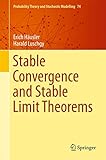Stable convergence and stable limit theorems / Erich Hausler and Harald Luschgy.
Series: Probability theory and stochastic modelling ; 74.Publication details: Cham : Springer, 2015.Description: x, 228 p. ; 24 cmISBN:- 9783319183282
- 519.2 23 H376
| Item type | Current library | Call number | Status | Date due | Barcode | Item holds | |
|---|---|---|---|---|---|---|---|
| Books | ISI Library, Kolkata | 519.2 H376 (Browse shelf(Opens below)) | Available | 137127 |
Browsing ISI Library, Kolkata shelves Close shelf browser (Hides shelf browser)
| No cover image available | No cover image available | No cover image available |

|
No cover image available |

|

|
||
| 519.2 H313 Theory of probability | 519.2 H313 Theory of probability | 519.2 H376 Elementary probability theory | 519.2 H376 Stable convergence and stable limit theorems / | 519.2 H558 Adaptive markov control progresses | 519.2 H615 Structural aspects in the theory of probability | 519.2 H615 Selected works of C C Heyde |
Includes bibliographical references and index.
1. Why stable convergence? --
2. Weak convergence of Markov Kernels --
3. Stable convergence of random variables --
4. Applications --
5. Stability of limit theorems --
6. Stable Martingale central limit theorems --
7. Stable functional Martingale central limit theorems --
8. A stable limit theorem with exponential rate --
9. Autoregression of order one --
10. Galton-Watson branching processes --
Appendix A --
Appendix B --
Abbreviations of formulas --
Notation index --
References --
Index.
The authors present a concise but complete exposition of the mathematical theory of stable convergence and give various applications in different areas of probability theory and mathematical statistics to illustrate the usefulness of this concept. Stable convergence holds in many limit theorems of probability theory and statistics - such as the classical central limit theorem - which are usually formulated in terms of convergence in distribution. Originated by Alfred Renyi, the notion of stable convergence is stronger than the classical weak convergence of probability measures. A variety of methods is described which can be used to establish this stronger stable convergence in many limit theorems which were originally formulated only in terms of weak convergence. Naturally, these stronger limit theorems have new and stronger consequences which should not be missed by neglecting the notion of stable convergence. The presentation will be accessible to researchers and advanced students at the master's level with a solid knowledge of measure theoretic probability.
There are no comments on this title.



























